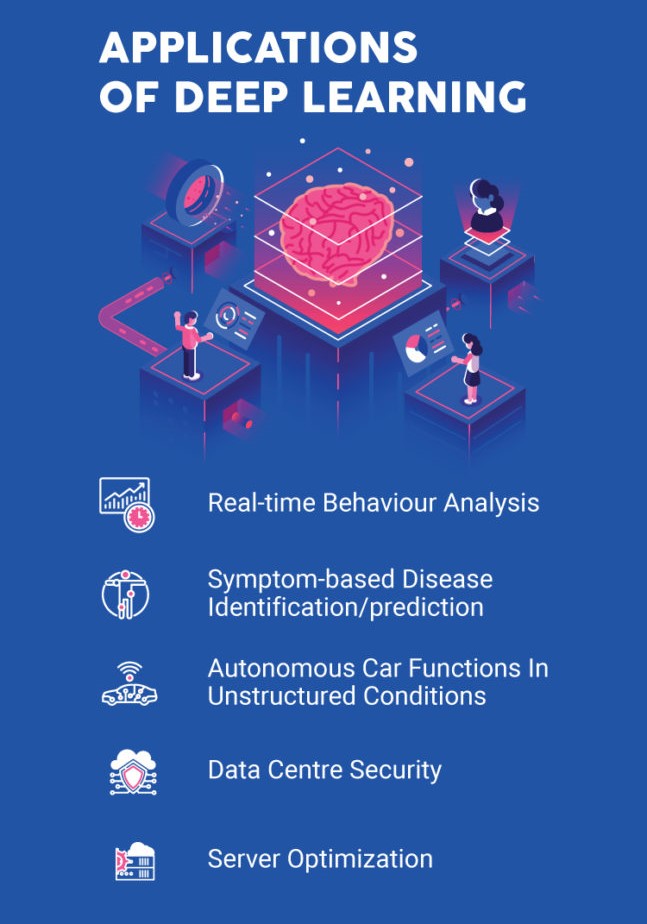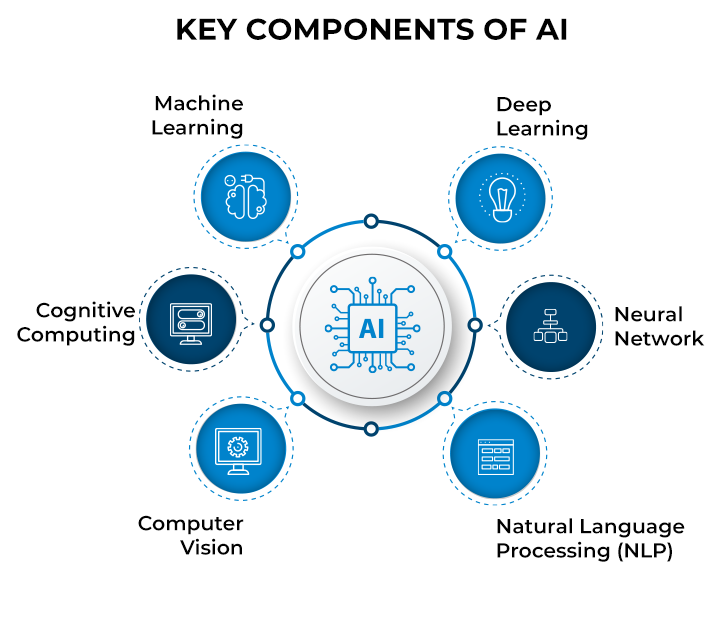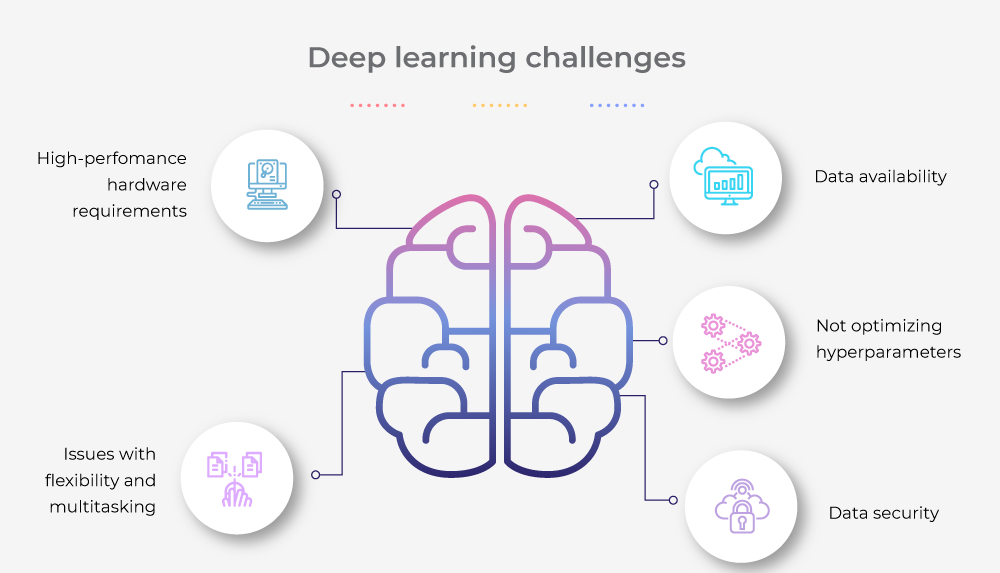Introduction to Advanced Deep Learning
As we delve into the realms beyond basic neural networks, deep learning reveals its profound capability to transform industries, innovate solutions, and unravel complexities within vast pools of data. This blog explores the nuanced applications of deep learning, showcasing how this technology is not just an evolution but a revolution in the field of artificial intelligence.
Advanced deep learning extends beyond foundational models and algorithms, venturing into the development of systems capable of understanding, learning, and making decisions with minimal human intervention. This advanced tier of deep learning paves the way for machines to tackle more complex and nuanced tasks, bridging gaps in various fields through intelligent automation and analysis.
Advanced Deep Learning: A Quick Recap
Advanced Deep learning, a subset of machine learning, employs layered neural networks to analyze various data types. This technique has surged in popularity due to its ability to learn without human supervision, using vast amounts of unstructured data to identify patterns and make intelligent decisions.
Deep learning’s ability to process and interpret vast datasets through layered neural networks has marked a significant milestone in the AI journey. It’s the depth of these layers, hence the name ‘deep learning,’ that enables the extraction of higher-level features from raw input, facilitating a more profound learning and understanding of data.
Deep Learning in Complex Domains
Intricately woven into the fabric of various sectors, deep learning is not just an academic pursuit but a practical tool driving innovation and efficiency. Its application in complex domains showcases its versatility and capacity to enhance and even revolutionize traditional methodologies.

Healthcare
Deep learning is revolutionizing healthcare by providing more accurate diagnoses and personalized treatment plans. By analyzing medical images, patient records, and genetic information, these systems can identify patterns and anomalies that may elude human experts, leading to earlier and more accurate diagnoses.
Moreover, deep learning models are instrumental in drug discovery and development, significantly reducing the time and cost associated with bringing new treatments to market. They can predict the efficacy of compounds, identify potential side effects, and suggest modifications to improve drug performance.
- Utilizing deep learning for predictive analytics in patient care and medical imaging.
Autonomous Vehicles
In the realm of autonomous vehicles, advanced deep learning is critical for processing the barrage of sensory data, enabling vehicles to make split-second decisions and learn from new driving scenarios. It’s at the heart of object detection, traffic prediction, and decision-making processes that keep passengers safe.
Beyond navigation and control, advanced deep learning helps autonomous vehicles adapt to varying environmental conditions and learn from diverse driving scenarios, enhancing their ability to operate safely in unpredictable real-world situations.
- Enhancing perception and decision-making systems in self-driving cars.
Financial Services
Advanced Deep learning has profoundly impacted the financial sector, particularly in areas like fraud detection, where it can identify subtle patterns indicative of fraudulent activity. Its predictive capabilities are also applied in algorithmic trading, where it can analyze market data to make trading decisions at speeds impossible for humans.
In risk management, deep learning algorithms assess the creditworthiness of borrowers, predict market risks, and optimize investment portfolios, showcasing the technology’s adaptability and precision in handling complex financial data.
- Detecting fraudulent activities and automating trading strategies.
Case Studies: Advanced Deep Learning at Work
Deep learning’s practical applications are as varied as they are impactful, demonstrating its ability to not only enhance existing processes but also to introduce novel solutions to longstanding challenges.
AlphaGo
AlphaGo’s victory against world champions in Go was a landmark moment in AI, illustrating deep learning’s potential to tackle problems characterized by immense complexity. The system’s ability to learn from thousands of games and simulate countless scenarios was pivotal in its success.
The techniques developed for AlphaGo have implications far beyond the game, offering insights into how deep learning can address complex decision-making tasks in various fields, from logistics and planning to the development of new materials and drugs.
- How DeepMind’s AlphaGo used deep learning to outmaneuver human champions in the complex game of Go.
Natural Language Processing
Advanced Deep learning has propelled natural language processing (NLP) to new heights, enabling more nuanced understanding and generation of human language. This has led to significant advancements in machine translation, sentiment analysis, and conversational AI, bridging communication gaps and enhancing user experiences.
Moreover, deep learning’s role in NLP is pivotal for extracting insights from unstructured text data, aiding in areas like market research, customer service, and even healthcare, where it can parse and interpret medical documentation and patient feedback.
- Deep learning’s role in advancing language translation and sentiment analysis.
Integrating Deep Learning with Other Technologies
The synergy between advanced deep learning and other technologies like IoT and blockchain is fostering new innovations, from enhancing cybersecurity to enabling smarter cities.
This convergence of deep learning with IoT and blockchain is not just augmenting current capabilities but is also paving the way for new paradigms in technology applications. For instance, in smart cities, deep learning can analyze data from IoT sensors to optimize traffic flow, reduce energy consumption, and improve public safety.
Simultaneously, when integrated with blockchain, it ensures the integrity and security of this data, creating a trustworthy and efficient ecosystem. This fusion not only enhances the performance and reliability of individual technologies but also creates a holistic framework where the combined benefits are greater than the sum of their parts, ushering in a new era of intelligent, interconnected, and secure technological solutions.

- Enhancing predictive maintenance in IoT
- Strengthening cybersecurity with anomaly detection
- Facilitating smart city developments through data analysis
- Combining deep learning with IoT for predictive maintenance in manufacturing.
- Enhancing cybersecurity with deep learning-driven threat detection systems.
Challenges in Advanced Deep Learning Applications
Despite its potential, deep learning faces hurdles, from ethical dilemmas to technical limitations, that must be navigated carefully. The technical challenges extend beyond just computational requirements; they delve into the realms of data quality and algorithmic transparency. Deep learning models are only as good as the data they are trained on, necessitating a robust framework for data acquisition and validation to prevent biases and inaccuracies.
Furthermore, the “black box” nature of deep learning poses significant hurdles in understanding decision-making processes within these models, raising concerns about accountability and interpretability in critical applications. Addressing these technical and ethical challenges is crucial for harnessing deep learning’s full potential while ensuring its alignment with societal norms and values.

- Addressing data bias and ensuring model transparency
- Tackling the environmental impact of training complex models
- Overcoming the black-box nature of deep learning algorithms
- Addressing data privacy concerns and the need for explainability in deep learning models.
- Tackling the computational demands and environmental impacts of training large models.
Ethical Considerations in Deep Learning
The ethical deployment of deep learning is paramount, ensuring that these powerful tools are used responsibly and for the benefit of society. Moreover, the ethical deployment of deep learning extends to considerations of fairness and inclusivity, ensuring that AI systems do not perpetuate or exacerbate existing inequalities.
This involves scrutinizing training datasets for biases, developing algorithms that are transparent and explainable, and engaging diverse stakeholders in the AI development process. By prioritizing these ethical dimensions, we can foster trust in AI systems and ensure that the benefits of deep learning are equitably distributed, ultimately leveraging this powerful technology to address societal challenges and improve human well-being.
- Ensuring data privacy and user consent
- Mitigating biases in AI algorithms
- Promoting transparency and understanding of AI decisions
- Navigating the moral landscape of AI to ensure responsible use of deep learning in sensitive applications.
Future Trends in Deep Learning
Deep learning is set to continue its trajectory of growth and innovation, with emerging trends shaping its future.
- The rise of generative AI and its creative capabilities
- The integration of deep learning with edge computing for faster, localized processing
- Advances in unsupervised learning reducing reliance on labeled data
- The rise of federated learning and quantum machine learning as next-gen technologies in the deep learning space.
Conclusion
Deep learning is not just a technological advancement; it’s a pivotal shift in how we approach problem-solving across various domains. By transcending basic applications, deep learning is setting a new benchmark in AI, offering insights and solutions that were once considered beyond our reach.
As deep learning ventures beyond the basics, its potential to transform industries and enhance our understanding of the world becomes increasingly evident. This journey into advanced deep learning applications not only showcases the technology’s capabilities but also highlights the responsibility that comes with deploying AI at such a scale, promising a future where deep learning continues to be a pivotal force in driving innovation and solving complex challenges.




Reviewed by 1 user
AI
Thank you for the valuable information on the blog.I am not an expert in blog writing, but I am reading your content slightly, increasing my confidence in how to give the information properly. Your presentation was also good, and I understood the information easily.
For more information Please visit the 1stepGrow website or AI and data science course.